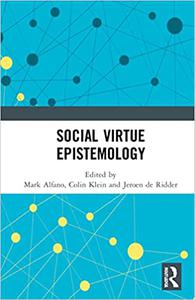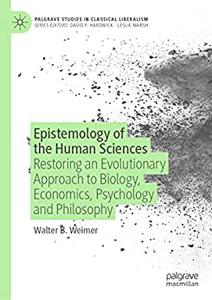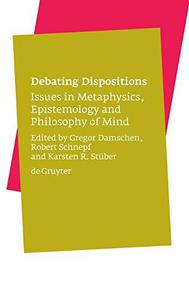

E-Books → The Epistemology of Resistance Gender and Racial Oppression, Epistemic Injustice, and Resistant Imaginations
Published by: voska89 on 22-12-2022, 17:49 |  0
0

José Medina, "The Epistemology of Resistance: Gender and Racial Oppression, Epistemic Injustice, and Resistant Imaginations"
English | 2012 | pages: 347 | ISBN: 0199929041, 0199929025 | PDF | 3,8 mb
This book explores the epistemic side of oppression, focusing on racial and sexual oppression and their interconnections. It elucidates how social insensitivities and imposed silences prevent members of different groups from interacting epistemically in fruitful ways-from listening to each other, learning from each other, and mutually enriching each other's perspectives. Medina's epistemology of resistance offers a contextualist theory of our complicity with epistemic injustices and a social connection model of shared responsibility for improving epistemic conditions of participation in social practices. Through the articulation of a new interactionism and polyphonic contextualism, the book develops a sustained argument about the role of the imagination in mediating social perceptions and interactions. It concludes that only through the cultivation of practices of resistance can we develop a social imagination that can help us become sensitive to the suffering of excluded and
E-Books → Social Virtue Epistemology
Published by: voska89 on 22-12-2022, 17:07 |  0
0

Mark Alfano, "Social Virtue Epistemology"
English | ISBN: 0367407647 | 2022 | 618 pages | PDF | 7 MB
This collection of 19 chapters, all appearing in print here for the first time and written by an international team of established and emerging scholars, explores the place of intellectual virtues and vices in a social world. Relevant virtues include open-mindedness, curiosity, intellectual courage, diligence in inquiry, and the like. Relevant vices include dogmatism, need for immediate certainty, and gullibility and the like.
E-Books → Capecchi D Epistemology and Natural Philosophy The Roots of Modern Physics 2021
Published by: Emperor2011 on 7-12-2022, 21:10 |  0
0

Capecchi D Epistemology and Natural Philosophy The Roots of Modern Physics 2021 | 14.94 MB
N/A | 901 Pages
Title: MAJESTIC PURE Himalayan Salt Body Scrub with Lychee Oil, Exfoliating Salt Scrub to Exfoliate & Moisturize Skin, Deep Cleansing - 10 oz
Author: N/A
Year: N/A
E-Books → On the Epistemology of the Senses in Early Chinese Thought
Published by: voska89 on 21-11-2022, 06:16 |  0
0

Jane Geaney, "On the Epistemology of the Senses in Early Chinese Thought"
English, Chinese | 2002 | ISBN: 0824825578 | PDF | pages: 278 | 8.4 mb
Sense perception, which is of enormous importance in Western philosophical traditions, has scarcely attracted the notice of scholars of early China. As a result of little direct comment on the senses in the Chinese philosophical classics, sinologists have generally interpreted their occasional references to sense functions in familiar Western philosophical terms. This original work challenges this tradition, arguing that despite the scarcity of direct comment on the senses in these sources, it is possible to discern early Chinese views of sensory functions from a close reading of the texts. Working with metaphorical and structural analysis, the author reconstructs an understanding of sense perception that seems to have been taken for granted by the early Chinese philosophers. By departing from traditional sinological approaches, this method uncovers a detailed picture of certain shared underlying views of sense perception in the Lun Yu, the Mozi (including the Neo-Mohist Canons), the Xunzi, the Mencius, the Laozi, and the Zhuangzi.
E-Books → Epistemology of the Human Sciences
Published by: voska89 on 21-11-2022, 06:02 |  0
0

Epistemology of the Human Sciences:
Restoring an Evolutionary Approach to Biology, Economics, Psychology and Philosophy
English | 2022 | ISBN: 3031171721 | 530 Pages | PDF EPUB (True) | 3.4 MB
E-Books → Debating Dispositions Issues in Metaphysics, Epistemology and Philosophy of Mind
Published by: voska89 on 10-10-2022, 15:24 |  0
0

Debating Dispositions: Issues in Metaphysics, Epistemology and Philosophy of Mind By Robert Schnepf (editor), Karsten R. Stuber (editor)
2009 | 344 Pages | ISBN: 3110184036 | PDF | 2 MB
Ordinary language and scientific discourse are filled with linguistic expressions for dispositional properties such as ""soluble,"" ""elastic,"" ""reliable,"" and ""humorous."" We characterize objects in all domains - physical objects as well as human persons - with the help of dispositional expressions. Hence, the concept of a disposition has historically and systematically played a central role in different areas of philosophy ranging from metaphysics to ethics. The contributions of this volume analyze the ancient foundations of the discussion about disposition, examine the problem of disposition within the context of the foundation of modern science, and analyze this dispute up to the 20th century. Furthermore, articles explore the contemporary theories of dispositions.
E-Books → Buddhist Epistemology as Apologetics
Published by: voska89 on 10-10-2022, 15:10 |  0
0

Vincent Eltschinger, "Buddhist Epistemology as Apologetics: Studies on the History, Self-understanding and Dogmatic Foundations of Late Indian Buddhist Philosophy ... Kultur-Und Geistesgeschichte Asiens NR. 81)"
English | 2014 | ISBN: 3700175833 | PDF | pages: 446 | 2.4 mb
This book deals first with the historical and doctrinal foundations of Dharmakirti's religious philosophy. It points to a socio-historical context of Brahmanical hostility toward non- and anti-Vedic denominations (chapter 1), new patterns of Buddhist self-diction (chapter 2), reinvented models of theoretical and apologetical rationality (chapter 3), and the dogmatic infrastructure underlying Buddhist epistemology (chapter 4). It argues that Buddhist "Tantrism" and Buddhist "logic," two roughly contemporary phenomena that can be regarded as the main literary outcomes of the "early medieval" period, share interesting features in terms of polemical targets and self-understanding. Since the end of the fifth century, intra-Buddhist polemics have become less relevant (at least in the form it had had heretofore) and partly receded into the background in favor of inter- or cross-confessional controversies. Departing from Abhidharma and addressing new, predominantly non-Buddhist targets resulted in the abandonment of scholastic, confession-specific terminology and methods as well as the development of new models of theoretical and apologetical rationality: first, the construction of a clear-cut concept of reason(ing) as opposed to scripture; second, the gradual constitution of a concept of practical rationality that served the apologetic purpose of defending the very possibility, or rationality, of the Buddhist path. Finally, the book examines the extent to which Buddhist epistemology can be said to be Buddhist at all as regards its deeper doctrinal structure. It attempts to interpret the foundations of Buddhist epistemology - the apoha theory, the doctrine of the pramanas, etc. - as a rationalization and an apologetically updated version of Buddhist dogmas on the structure of ultimate and conventional realities, on the cognitive bases of error and its elimination, and on the cintamayi prajna ("insight born of reflection") as a salvific means of a predominantly inferential order.
E-Books → Thomas Reid and the Story of Epistemology
Published by: voska89 on 24-09-2022, 01:24 |  0
0

Nicholas Wolterstorff, "Thomas Reid and the Story of Epistemology "
English | ISBN: 0521539307 | 2004 | 280 pages | PDF | 933 KB
Nicholas Wolterstorff's comparative analysis of Thomas Reid's epistemology relates Reid's philosophy to present-day epistemological discussions. This timely and relevant volume will be of great interest to historians of philosophy as well as philosophers concerned with epistemology and the philosophy of mind. Hb ISBN (2000): 0-521-79013-1
E-Books → Digital Cognitive Technologies Epistemology and the Knowledge Economy
Published by: voska89 on 3-08-2022, 23:36 |  0
0

Digital Cognitive Technologies: Epistemology and the Knowledge Economy By
2010 | 414 Pages | ISBN: 1848210736 | PDF | 9 MB
Digital Cognitive Technologies is an interdisciplinary book which assesses the socio-technical stakes of Information and Communication Technologies (ICTs), which are at the core of the Knowledge Society. This book addresses eight major issues, analyzed by authors writing from a Human and Social Science and a Science and Technology perspective. The contributions seek to explore whether and how ICTs are changing our perception of time, space, social structures and networks, document writing and dissemination, sense-making and interpretation, cooperation, politics, and the dynamics of collective activity (socio-informatics).Content: Chapter 1 Elements for a Digital Historiography (pages 1-21): Andrea IacovellaChapter 2 "In Search of Real Time" or Man Facing the Desire and Duty of Speed (pages 23-36): Luc Bonneville and Sylvie GrosjeanChapter 3 Narrativity Against Temporality: A Computational Model for Story Processing (pages 37-56): Eddie SoulierChapter 4 Are Virtual Maps Used for Orientation? (pages 57-70): Alain MilonChapter 5 Geography of the Information Society (pages 71-87): Henry Bakis and Philippe VidalChapter 6 Mapping Public Web Space with the Issuecrawler (pages 89-99): Richard RogersChapter 7 Metrology of Internet Networks (pages 101-117): Nicolas Larrieu and Philippe OwezarskiChapter 8 Online Social Networks: A Research Object for Computer Science and Social Sciences (pages 119-136): Dominique Cardon and Christophe PrieurChapter 9 Analysis of Heterogenous Networks: The ReseauLu Project (pages 137-152): Alberto Cambrosio, Pascal Cottereau, Stefan Popowycz, Andrei Mogoutov and Tania VichnevskaiaChapter 10 Hypertext, an Intellectual Technology in the Era of Complexity (pages 153-167): Jean ClementChapter 11 A Brief History of Software Resources for Qualitative Analysis (pages 169-186): Christophe LejeuneChapter 12 Sea Peoples, Island Folk: Hypertext and Societies without Writing (pages 187-201): Pierre MarandaChapter 13 Semantic Web and Ontologies (pages 203-218): Philippe LaubletChapter 14 Interrelations between Types of Analysis and Types of Interpretation (pages 219-230): Karl M. Van MeterChapter 15 Pluralism and Plurality of Interpretations (pages 231-243): Francois Daoust and Jules DuchastelChapter 16 A Communicational and Documentary Theory of ICT (pages 245-264): Manuel ZackladChapter 17 Knowledge Distributed by ICT: How do Communication Networks Modify Epistemic Networks? (pages 265-281): Bernard ConeinChapter 18 Towards New Links between HSS and Computer Science: The CoolDev Project (pages 283-297): Gregory Bourguin and Arnaud LewandowskiChapter 19 Electronic Voting and Computer Security (pages 299-316): Stephan BrunessauxChapter 20 Politicization of Socio?Technical Spaces of Collective Cognition: The Practice of Public Wikis (pages 317-329): Serge Proulx and Anne GoldenbergChapter 21 Liaising Using a Multi?Agent System (pages 331-341): Maxime MorgeChapter 22 The Interdisciplinary Dialog of Social Informatics (pages 343-356): William TurnerChapter 23 Limitations of Computerization of Sciences of Man and Society (pages 357-371): Thierry FoucartChapter 24 The Internet in the Process of Data Collection and Dissemination (pages 373-388): Gael Gueguen and Said Yami
E-Books → Epistemology and Metaphysics for Qualitative Research
Published by: voska89 on 13-07-2022, 11:44 |  0
0

Tomas Pernecky, "Epistemology and Metaphysics for Qualitative Research"
English | ISBN: 1446282384 | 2016 | 248 pages | EPUB | 5 MB
This clearly written and provocative text outlines the wide range of epistemological and metaphysical pillars of research.



